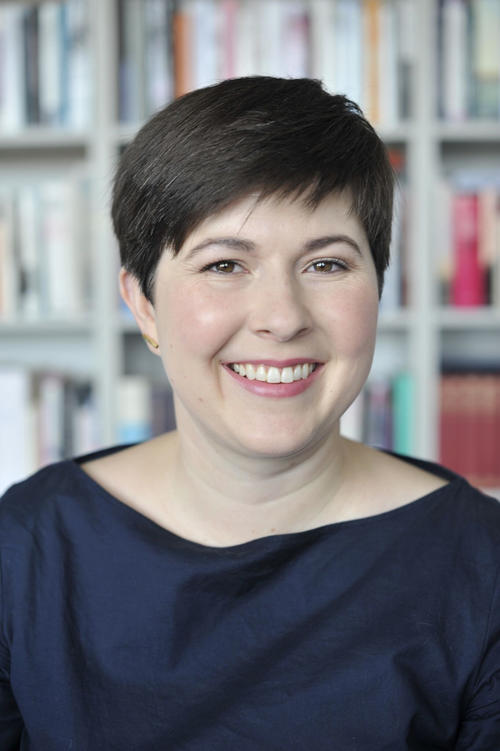“There are many things universities can do to address sexual violence. The first may sound obvious: name the problem!”
Interview with Dr. Sarah Bellows-Blakely on the International Day for the Elimination of Violence against Women
Nov 25, 2024
“Support the University – Take a Stand against Sexualized Harassment, Discrimination and Violence” is this year’s campaign honoring the International Day for the Elimination of Violence against Women on November 25.
Image Credit: Freie Universität Berlin
November 25 is the International Day for the Elimination of Violence against Women. In tribute to this day Freie Universität Berlin is hosting a panel discussion with experts who will address structural and organizational factors related to sexualized harassment and violence at universities. They will devote special attention to discussing preventative measures in general and at Freie Universität specifically. One of the experts is Dr. Sarah Bellows-Blakely, leader of the junior research group “Fixing the System: Analyses in the Context of the History of Science” at the Margherita von Brentano Center for Gender Studies at Freie Universität. Bellows-Blakely is also a lecturer in the master’s degree program “Global History.”
What are the main research objectives of your research group “Fixing the System”?
My research group analyzes how specific frameworks for diversity and gender have and have not institutionalized over time. We are interested in studying what happens to different understandings of diversity and gender as they are integrated into institutions, written into policy norms, and go through transformations as part of bureaucratic processes.
Dr. Sarah Bellows-Blakely is leader of the junior research group “Fixing the System: Analyses in the Context of the History of Science” at the Margherita von Brentano Center for Gender Studies at Freie Universität.
Image Credit: Christoph Kalter
You are analyzing institutional responses to sexual harassment at Berlin universities from the mid-twentieth century to today. When and how did the topic emerge at Freie Universität for the first time?
We have found that some of the biggest changes occurred in the 1980s, when people began to explicitly name the problems of sexual harassment and sexual violence as widespread within universities. Often, it was female students and staff who were the first to publicly name the problems. They felt that the university structures protected abusers, often professors, and allowed sexual violence to flourish and remain unacknowledged. We have found that organized student protests in former West Berlin – such as a student-led protest at Freie Universität in 1984 – were frequently successful in drawing media attention to the problem, which then prompted university action. We still see this today: institutions often act faster when they are under public scrutiny.
Based on your material, what was significant about the student protest at Freie Universität in 1984? What changed at the institution in the aftermath?
The 1984 student protest at Freie Universität is one of the first cases where we have people collectively and publicly naming sexual harassment and sexual violence at universities as entrenched problems. Those students were protesting against two male doctors from the university’s gynecological clinic, who were accused of raping a female doctor in training. At the protest, the students wore white medical coats and marched with signs to protest both the doctors and the university’s ostensible lack of response. These protests did not occur in isolation; they were part of a larger, global movement to expose the prevalence of violence against women between the 1970s and 1990s. These kinds of protests sparked public conversations and debates and contributed to bureaucratic changes within universities and their governing bodies. For example, in 1986, the West Berlin Academic Senate formed a working group to define sexual harassment and its widespread existence at universities. The same year the Berlin Higher Education Act was passed. The new law included Paragraph 59, which paved the way for the creation of Frauenbeauftragte (women’s representatives) at Freie Universität and Technische Universität Berlin.
How does the category of gender factor into an organizational analysis like yours and why is it necessary to use it?
My research group combines gender history with organizational theories of gender. Gender history insists on looking at change over time and space. In other words, it does not treat patriarchy or violence against women as natural or inevitable. It asks when, where, and under what conditions sexual violence increases or decreases. Organizational theories of gender interrogate how and why sexual harassment and violence flourish in certain kinds of institutions and in formalized relationships of power. Similar to the Catholic Church or Hollywood, universities are sites where sexual harassment and violence thrive. Gendered organizational theory helps us understand this as an institutional problem, rather than a problem that exists primarily at the level of the individual. Taken together, gendered histories and organizational theories allow us to ask which kinds of bureaucratic structures within universities have made the problems of sexual harassment and violence worse and which have improved the situation over time.
November 25 serves as an annual reminder that we still need to scrutinize existing power structures that enable sexual harassment. Following the idea behind the slogan “fix the system not the women,” what still has to change at universities?
There are many things that universities can and should do to address sexual violence. The first may sound obvious, but it is actually all too often lacking: name the problem! Sexual violence and sexual harassment flourish at universities. Extensive, rigorous, peer-reviewed studies have shown this. And yet, the problem and its prevalence are regularly swept under the rug. Second, the current reporting measures at universities to prevent and respond to harassment are inadequate – this also goes for the investigative and justice-focused measures in place. Too often, survivors/victims who come forward are punished. Universities rarely implement appropriate consequences for perpetrators. Research suggests that if eyewitnesses and bystanders could formally report cases of sexual violence to university administrators, and if they could file reports collectively, that would help remove the burden from victims/survivors and make people more likely to speak up. Third, our research shows that gender equality officers throughout Germany are often overworked, underpaid, and not given the administrative power they need to actually sanction perpetrators or prevent gender-based violence from occurring. Too many universities give the impression that they want to publicly look like they are taking the problem seriously while refusing to acknowledge the extent of the problem. They often fail to give experts within the university the power to systemically improve conditions.
The original German version of this article appeared in campus.leben, the online magazine published by Freie Universität Berlin.
Further Information
“Wish Box”: from Wish to Reality
What wishes or suggestions do you have regarding how reports of sexualized harassment, discrimination, and violence should be handled at Freie Universität Berlin? How can confidential conseling services be improved here? Use the digital wish box to send your wishes to the central contact person for sexualized harassment. It is not necessary to leave your name.
Event Program
The Gender*Equality Team at Freie Universität Berlin has put together an events program beginning Monday, November 25, 2024, to commemorate International Day for the Elimination of Violence against Women. You can find further information here.


